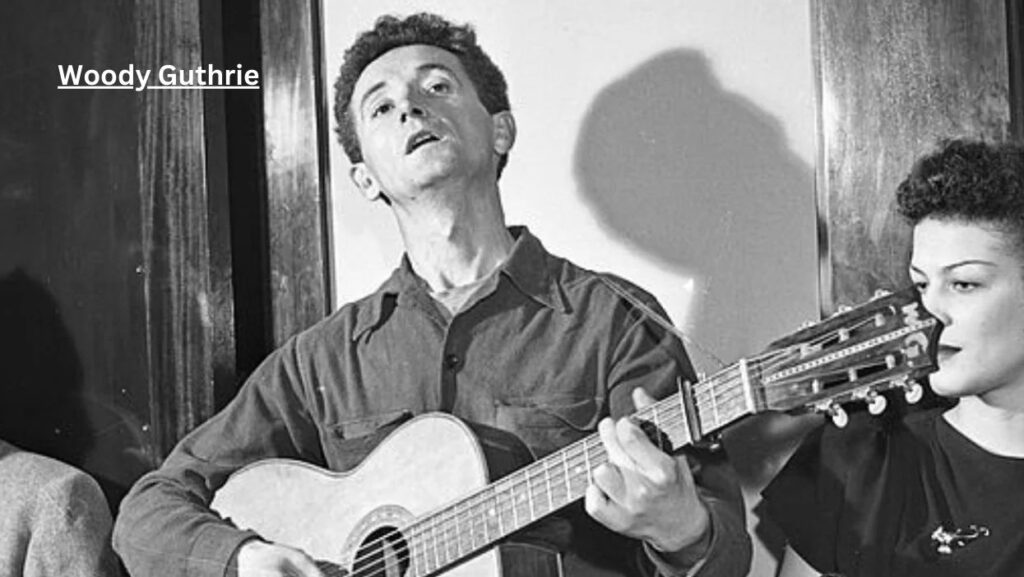Woodro Wilson Guthrie, known as Woody Guthrie, was born July 14, 1912 in Okimah, Oklahoma. His early life was characterized by both creativity and difficulties. When he grew up in a family facing financial struggles, Guthari first experienced the challenges of the rural America. Despite these difficulties, his environment was rich in music, stories and folk traditions that would later shape his art. His mother, Nora introduced him to music, and sang old Gathagit and hymns, who provoked the passion of his life to tell the story.
The tragedy hit Guthrie’s family quickly, his mother diagnosed Huntington’s disease, a condition that will later take his life. His father’s financial problems also created instability, forcing Woody to be forced into himself as a teenager. These experiences created him a deep understanding of poverty and injustice, which will be central to his work.
Woody Guthrie’s Journey Across America
As a young man, Guthrie met the road under great depression, traveled across the country in search of work and a sense of purpose. He often drives vehicles and immerses himself in ordinary people’s lives. His visit brought him face to face with the battles of farmers, factory workers and migrant workers. These meetings influenced their art art and inspired him to use music as a social change tool.
Guthrie began to perform in small towns, sang songs and reflects the lives of those they met on their way. He is known for his ability to capture the spirit of the working class and tell his stories with honesty and compassion. His music echo with the audience, who watched his own matches in his songs.
Woody Guthrie and the Birth of Protest Music
Woody Guthrie’s songwriting was driven by a desire to address social and political issues. He wrote songs about economic inequality, labor rights, and the plight of the poor. His most famous song, “This Land Is Your Land,” was penned in 1940 as a response to the overly optimistic “God Bless America,” offering a more inclusive vision of the country.
His lyrics were straightforward and heartfelt, often drawing from traditional folk melodies. This approach allowed his songs to reach a wide audience, transcending barriers of class and geography. Guthrie’s music wasn’t just entertainment; it was a call to action, urging listeners to stand up for justice and fairness.
Woody Guthrie’s Influence on the Folk Revival
Guthrie’s impact on American music extended far beyond his own lifetime. He became a key figure in the folk music revival of the 1950s and 1960s, inspiring artists such as Bob Dylan, Pete Seeger, and Joan Baez. These musicians carried forward his tradition of using music to address societal issues, ensuring that his legacy lived on.
Bob Dylan, in particular, cited Guthrie as a major influence, once traveling to New York City specifically to meet his hero. Guthrie’s ability to blend storytelling with activism set a standard for generations of songwriters. His songs became anthems for social movements, from civil rights to labor struggles.
Woody Guthrie’s Personal Challenges and Legacy
In his later years, Guthrie faced significant health challenges. He was diagnosed with Huntington’s disease, the same genetic disorder that had affected his mother. The illness gradually robbed him of his ability to perform and create, but his influence continued to grow.
Guthrie’s children, including Arlo Guthrie, carried on his musical legacy. Arlo became a celebrated folk musician in his own right, performing songs that echoed his father’s commitment to social justice. The Guthrie family has also worked to preserve Woody’s contributions through the Woody Guthrie Center in Tulsa, Oklahoma, which serves as a museum and archive dedicated to his life and work.
The Enduring Power of Woody Guthrie’s Music
Woody Guthrie’s songs remain as relevant today as they were when he first wrote them. His ability to capture the struggles and hopes of ordinary people has made his work timeless. Songs like “This Land Is Your Land” continue to be sung at rallies, protests, and gatherings, symbolizing unity and resilience.
His guitar famously bore the inscription “This machine kills fascists,” reflecting his belief in the power of art to challenge oppression. This spirit of defiance and hope continues to inspire activists and artists around the world.
Woody Guthrie’s Illness
Woody Guthrie, the iconic American folk musician, battled a debilitating illness for much of his later life. He was diagnosed with Huntington’s disease, a hereditary and progressive neurological disorder that affects muscle coordination and cognitive function. The symptoms began to appear in the 1940s, gradually impacting his ability to perform and communicate. By the 1950s, Guthrie’s condition had worsened, leading to frequent hospitalizations. Despite his illness, his legacy lived on through his music and the influence he had on future generations of artists.
Conclusion
Woody Guthrie’s life and music exemplify the power of storytelling to create change. Through his songs, he gave a voice to those who were often ignored, shining a light on the struggles and triumphs of the working class. His legacy endures as a reminder of the importance of standing up for justice and using creativity to inspire action.
From the dust storms of the Great Depression to the vibrant folk revival, Guthrie’s influence has spanned decades, touching the hearts of millions. His work serves as a testament to the enduring strength of the human spirit and the transformative power of music.

